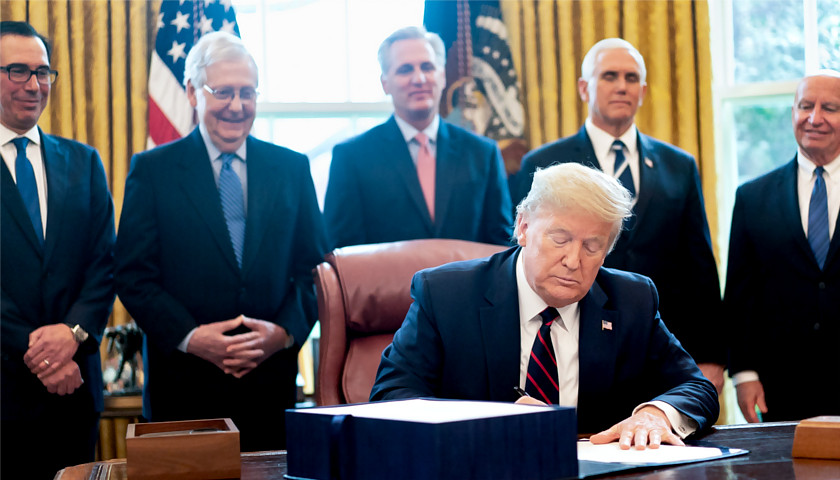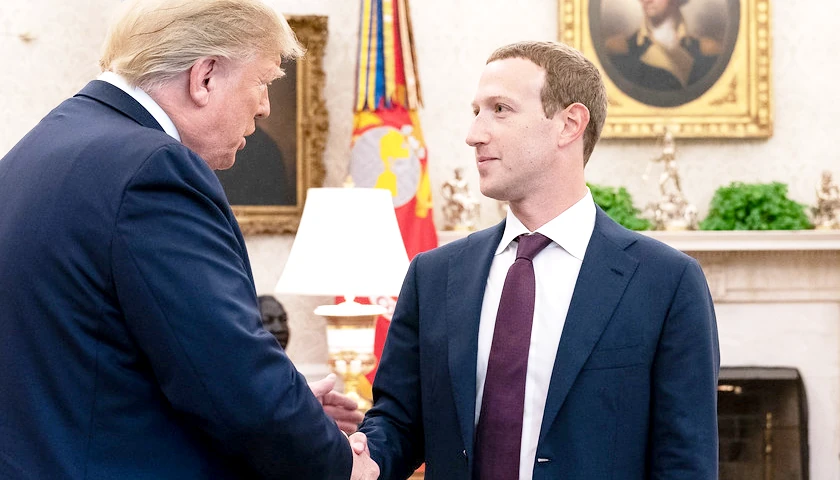by Rachel Bovard
The House of Representatives on Friday passed the Senate’s $2 trillion coronavirus relief package and sent it to the president. What initially began as a bill designed to help the workers and families hurt by job loss or disruption caused by government measures to fight coronavirus morphed into an 880-page behemoth.
Here are the highlights: the good, the bad, and the ugly.
The Good
Relief is temporary and targeted, and designed to help families and workers fast.
Coronavirus has hit working families hard. If they’re not sick, then they can’t work because the government has kicked them off the job to implement “social distancing” and other public health measures. Small business owners, who generally live on small margins, are told their businesses must close – even though the mortgage, utility bills, and payroll are still due.
The Coronavirus Aid, Relief, and Economic Security (CARES) Act was initially drafted to support these people, to make up for the government-mandated sacrifices required in a public health crisis. The good news is that it still did.
While advocates of limited government traditionally oppose this kind of state-run care, conservatives and even some libertarians acknowledge that this is the limited role government should play, particularly when it is the government forcing people off the job for reasons of public health.
What’s more, these provisions are temporary, designed to help families through a crisis not of their own making.
Direct relief to families.
All U.S. residents with adjusted gross incomes up to $75,000 ($150,000 for married couples) will get a one-time $1,200 ($2,400 for couples) “rebate” payment. They are also eligible for an additional $500 per child. Payments will start phasing out for earners above those income thresholds, and will not go to single filers earning more than $99,000, head-of-household filers with more than $146,500, or more than $198,000 for joint filers with no children.
The initial draft of the legislation put out by Majority Leader Mitch McConnell (R-KY) had made these payments regressive and based on 2018 tax filings, creating a situation that would punish poor families – who would need the help the most – and failing to recognize major changes in circumstances that can happen in two years.
Thanks to the work of Senators Josh Hawley (R-MO), Mitt Romney (R-UT), and Tom Cotton (R-AR) in particular, the payments were updated to be based on 2018 or 2019 returns. Checks will go to all families, as well as seniors and the disabled, not just those who had a tax bill.
Expanded unemployment insurance for those kicked off the job by the coronavirus.
Unemployment insurance will be expanded for four months to those who cannot work because they’re either sick with coronavirus, their workplace is closed due to government public health mandates (those who are paid while teleworking are exempt), or they are caring for someone with coronavirus or for a child who is home due to coronavirus related school closures.
The trick here, however, is getting access to relief. Unemployment offices around the country are overwhelmed and unresponsive. Even the unemployment websites keep crashing.
Small business loans.
Small businesses and nonprofits under 500 employees will have access to $350 billion worth of loans to help bridge the period of state government-mandated closures. Loans taken by small businesses to keep employers on payroll may be forgiven. The federal government will forgive eight weeks of cash flow, rent, and utilities.
Small businesses can also opt for a tax credit for keeping idled wages on their payrolls during the pandemic, if certain criteria are met.
Congress disappointed everyone by taking weeks to pass this bill instead of days – and this may be compounded through the Small Business Administration process, which can take nearly a month.
Because Congress dragged its feet, relief may be coming too late for some small businesses.
Hospitals, as well as state and local governments, get help
The measure provides $100 billion for hospitals to help them deal with capacity issues, lack of equipment, and patient treatment. State and local governments, some of which are struggling with lack of revenue and unemployment insurance demands due to business closures to comply with government public health recommendations, will also have access to $150 billion. Another $8 billion is set aside for local governments, and no state will get less than $1.5 billion.
The Bad
A $450 billion fund for corporate lending, doled out largely at the discretion of the treasury secretary and amplified by $4 trillion in lending from the Federal Reserve.
While small businesses operate on thin margins, large businesses have more of a cushion (that is, if they’re not using all their profits to juice their market price by buying back all their stock). That said, if the goal of government support in a public health crisis is to help people remain employed, there is an argument that some corporate assistance may be warranted.
The legislation provides around $450 billion worth of loans ostensibly for struggling industries, cities, and states, all at the discretion of Treasury Secretary Steven Mnuchin. Rules added to the bill will order an inspector general and an accountability committee to oversee how the money is spent, but oversight is only as good as the overseers. If an oversight board is used to weaponize a political agenda in any direction, it will lose credibility. It is also unclear how much authority this oversight board will actually have.
The lending in the bill will also be coupled with $4 trillion worth of special business lending programs implemented by the Federal Reserve.
The direct lending authorized by the legislation comes with strings. No loan can exceed five years, and corporations that receive the money cannot engage in stock buybacks or pay dividends for one year. Executive compensation for corporations borrowing government funds is also limited.
Special provisions for the airline industry.
The airlines were the only industry specifically carved out in the legislation for explicit support. The airline industry will get $58 billion, half in grants and half in loans, as well as a reprieve from three major excise taxes. Half of the funds go toward “continuation of payment of employee wages, salaries, and benefits,” while the other half goes to loans and loan guarantees for passenger airlines, repair stations, and ticket agents.
The law also stipulates that borrowing corporations must maintain their employment levels to the extent practicable until September 30. Yet on Friday, United Airlines announced that the company would be taking the money—but very likely laying off people in the fall.
The Ugly
The whole stinking process.
A full picture of this bill isn’t clear without an understanding of how flawed the process of passage was. In the Senate, staff scrambled for drafts of the legislation that somehow were only available to lobbyists. The final version of the bill was released just 20 minutes before the Senate’s vote. The majority leader’s office did not alert senators to what the new changes were. No one had time to read the final 880-page bill before it passed.
In the House, Representative Thomas Massie (R-KY-04) requested a recorded vote on the biggest single relief bill in history. A recorded vote simply means the vote of every member is written down, as opposed to everyone simply nodding at one another in agreement. Massie was denied his request by both Republicans and Democrats, who refused to grant him the sufficient second necessary to proceed.
Worse still, there were enough members present to constitute the quorum necessary to hold a recorded vote. Walking off the floor, Massie called it a “cover-up.”
“They had enough people there to pass the bill,” he said, “but they still refuse to have a recorded vote, and they told me they were trying to protect members.”
In denying Massie what is normally the rote institutional courtesy of a sufficient second, the House of Representatives passed a $2 trillion bill without any members having to go on record for it.
Provisions that will surge layoffs.
In the hours before the Senate vote, a group of four Republican senators identified a provision they assumed was a drafting error made in haste: individuals eligible for unemployment insurance will receive 100 percent of their income at the state level, but also $600 a week from the federal government.
This provision will incentivize layoffs, they argued, because individuals will actually make more money being unemployed than they will at their jobs. An amendment by Ben Sasse (R-NE) to fix the provision was defeated in a 48-48 tie.
Unrelated pork for legislators, lobbyists, and unions
If legislators and lobbyists are skilled at anything, it is never letting a crisis go to waste. The CARES Act is an emergency coronavirus relief bill, designed to help the families and businesses impacted by a government response to a public health crisis.
But in a crisis, there is opportunity. At least, there is if securing government funding is your goal.
Take Boeing, for example, the company with planes that keep crashing. The company got a special $17 billion carveout.
The Treatment of Sunscreen Innovation Act also mysteriously made it into the legislation – in fact, a bill to address coronavirus, a viral infectious disease, mentions the word “sunscreen” 49 times. The bill provides for FDA approval of “innovative” sunscreens, and largely benefits the French cosmetics giant L’Oreal, which has operations in Kentucky – where Senate Majority Leader Mitch McConnell is up for re-election in November.
The Harbor Maintenance Trust Fund also got a boost when its spending limits were removed. This largely benefits Senate Appropriations Committee Chairman Richard Shelby (R-Ala.), whose home-state ports will be dredged as a result. One GOP aide characterized the decision as “easy to give Shelby, since he’s been wanting it for years and now why not give it to him?”
Apparently this coronavirus relief bill is about “wins” for Richard Shelby. If only the Americans struggling to pay rent had such a willing advocate anywhere in the Senate’s leadership.
The pro-labor lobby also got its claws into the bill with a requirement for those companies taking loans. For the length of the loan, companies must stay neutral in any attempt by their employees to organize a union—a direct slap at right-to-work states.
The government itself also grew larger. Even after receiving their annual pot of money for the year, big-spending appropriators saw fit to lavish even more largesse onto areas of the government.
Take a look at a sampling of what lawmakers will tell you is so very necessary to help the workers and families impacted by coronavirus:
- $10 billion loan to the U.S. Postal Service
- Extension of $48 million in sex-ed funding
- $25 million in “salaries and expenses” for the House of Representatives
- $60 million for NASA
- $500,000 for a water project in Central Utah
- $3 million for “forest and rangeland research” by the U.S. Forest Service
- $78,000 “payment” to the Institute of American Indian and Alaska Native Culture and Arts Development
- $99 million for the Department of Energy
- $25 million to the John F. Kennedy Center for the Performing Arts
- $75 million in grants to the National Endowment for the Arts
- $75 million in grants to the National Endowment for the Humanities
- $75 million to the Corporation for Public Broadcasting
- $7.5 million to the Smithsonian Institution
- $50 million to the Institute of Museum and Library Services
What started as a meaningful relief effort for workers and families morphed, as it so often does, into a ride-along for unrelated—and a few ridiculous—provisions designed to benefit certain lawmakers or expand the bureaucracy. Even when facing down a pandemic, Congress just can’t pass up the opportunity to benefit their re-election campaigns, their own projects, and those of their friends.
– – –
Rachel Bovard is senior director of policy at the Conservative Partnership Institute and Senior Advisor to the Internet Accountability Project.





